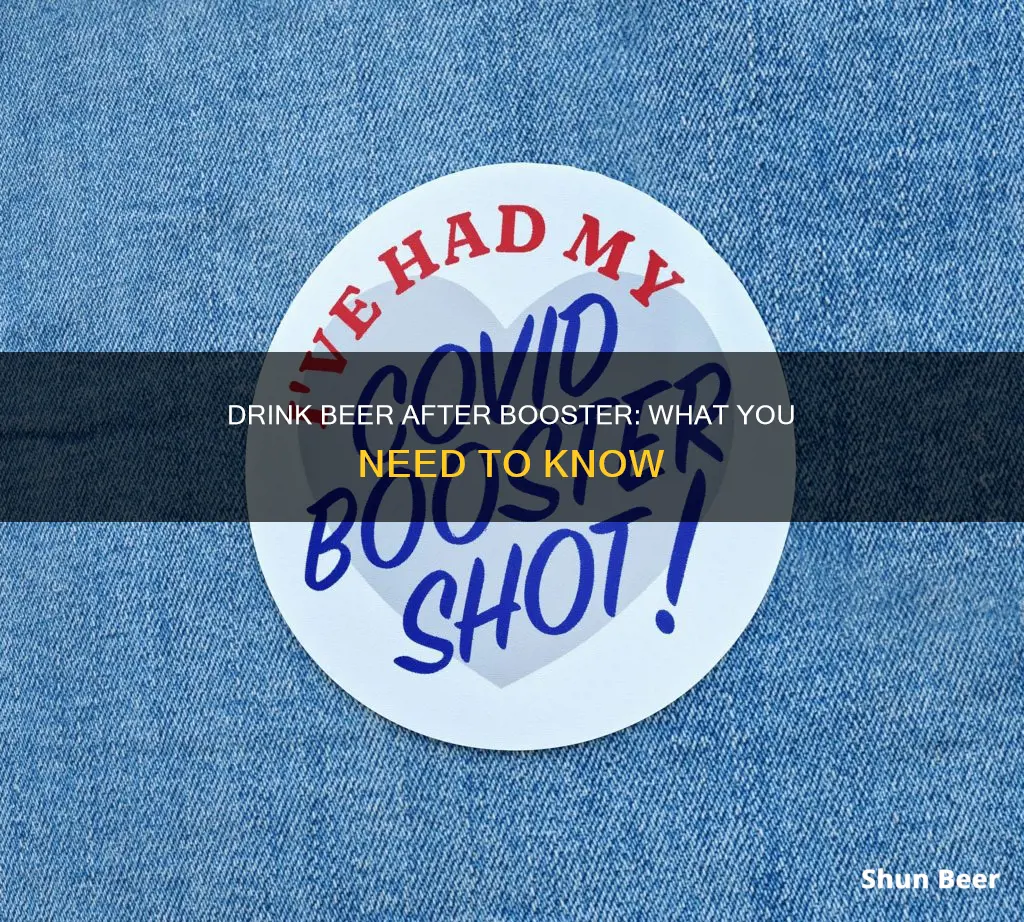
Since the onset of the pandemic, patients have been asking whether they can consume alcoholic beverages after receiving their COVID-19 vaccine or booster shot. While moderate drinking is unlikely to impair the immune response to the COVID-19 vaccine or booster, heavy drinking might. According to experts, heavy alcohol consumption, particularly over the long term, can suppress the immune system and potentially interfere with your vaccine response. However, moderate drinking, defined as no more than two drinks a day for men and a maximum of one drink a day for women, is not expected to impact the immune response to the COVID-19 vaccine or booster significantly.
| Characteristics | Values |
|---|---|
| Is drinking beer after a COVID-19 booster safe? | There is no official guideline on drinking alcohol after a COVID-19 booster. However, some experts advise against drinking right after getting vaccinated. |
| How much alcohol can you drink after a COVID-19 booster? | Moderate drinking is defined as no more than two drinks a day for men and a maximum of one drink a day for women. Heavy drinking is defined as four or more drinks on any day for men and three or more drinks for women. |
| What are the effects of drinking alcohol after a COVID-19 booster? | Excessive alcohol consumption can lead to a weakened immune system, making individuals more susceptible to infection and potentially weakening their response to a vaccine. |
What You'll Learn

Experts advise against heavy drinking after a COVID-19 booster
While there are no official guidelines, experts advise against heavy drinking after receiving a COVID-19 booster or vaccine. Although the COVID-19 vaccine will still be effective, heavy drinking can weaken your immune system, making you more susceptible to infection and reducing your body's ability to fight it.
According to Dr. Mark Loafman, chair of family and community medicine for Cook County Health, "excessive" alcohol consumption can lead to a weakened immune system. He defines "excessive" as more than one drink a day for women and more than two drinks a day for men over a sustained period. Chronic heavy drinking has been shown to increase your risk of bacterial and viral infections.
Some experts recommend abstaining from alcohol for 48 to 72 hours after receiving a COVID-19 booster or vaccine. This is the typical period when you may experience mild side effects from the vaccine, such as fatigue, muscle aches, and injection site pain. Drinking alcohol may worsen these side effects, and it can be challenging to distinguish between hangover symptoms and vaccine side effects.
Moderate drinking, defined as one drink per day for women and up to two drinks per day for men, is less likely to impair your immune response to the COVID-19 vaccine. However, it is important to note that alcohol affects women differently than men due to their biology and chemistry. Women absorb more alcohol and take longer to metabolize it, increasing their risk of long-term negative health consequences.
In conclusion, while there is no official guidance on drinking alcohol after a COVID-19 booster, experts advise against heavy drinking as it can negatively impact your immune system and potentially interfere with your vaccine response. Moderate drinking is generally considered lower-risk, but it is still important to drink in moderation and be mindful of your alcohol consumption's potential effects on your health.
Beer and Covid Shots: What You Need to Know
You may want to see also

Light drinking may not affect the body's immune response
However, it's important to note that chronic heavy drinking has been shown to increase the risk of bacterial and viral infections and negatively impact the immune system. Heavy drinking is defined as more than seven drinks per week for females and more than 14 drinks per week for males.
While there is no official guidance on drinking alcohol after receiving a COVID-19 booster or vaccine, some experts advise avoiding alcohol for a few days to a week after vaccination. This is because the side effects of a hangover, such as fatigue, headache, and nausea, may mimic or worsen the common side effects of the vaccine.
Additionally, drinking alcohol may cause adverse effects when mixed with certain medications used to treat COVID-19 symptoms. For example, mixing alcohol with fever reducers may cause bleeding, a rapid heartbeat, ulcers, and an upset stomach.
Therefore, while light drinking may not affect the body's immune response, it is always important to drink in moderation and be mindful of potential interactions with other substances.
Lent: Beer-Only Man Bets and Drinking Habits
You may want to see also

Alcohol may worsen side effects of the COVID-19 booster
While there is no official guidance on drinking alcohol after receiving a COVID-19 booster shot, some experts advise against drinking—especially heavy drinking—immediately after being vaccinated. Although there is no evidence that alcohol affects the efficacy of the booster, it may worsen the side effects of the vaccine.
Potential Side Effects of the COVID-19 Booster
According to the Centers for Disease Control and Prevention (CDC), the COVID-19 vaccine can cause short-term side effects, such as fever, headache, fatigue, and pain at the injection site. These side effects may be mistaken for hangover symptoms if you consume alcohol after receiving the booster.
Alcohol's Impact on the Immune System
Research suggests that chronic, heavy alcohol use can impact the immune system and lower immunity. A 2021 study found that binge drinking increases gut permeability, allowing toxins, bacteria, and other harmful substances to leak through the gut wall, leading to a state of chronic inflammation.
Recommendations for Alcohol Consumption After the COVID-19 Booster
To avoid potential side effects and negative interactions, it is advisable to abstain from or reduce alcohol intake for 48–72 hours after receiving the COVID-19 booster. This is the typical period when mild after-effects of the vaccination, such as fatigue, muscle aches, and injection site pain, may occur.
Moderate alcohol consumption, defined as one drink per day for women and up to two drinks per day for men, is generally considered acceptable and is not expected to interfere with the vaccine's effectiveness. However, excessive alcohol consumption, defined as more than one drink per day for women and more than two drinks per day for men consistently over time, can weaken the immune system and may impair your body's response to the vaccine.
Therefore, while occasional light or moderate alcohol consumption is unlikely to affect your immune response to the COVID-19 booster, it is important to be mindful of your alcohol intake to ensure optimal vaccine effectiveness and avoid potential side effects.
Drinking Beer While Taking Allegra: Is It Safe?
You may want to see also

Excessive alcohol consumption can weaken the immune system
While there are no official guidelines, some experts advise against drinking alcohol right after getting a COVID-19 booster or vaccine. This is because alcohol may worsen the side effects of the vaccine, such as fatigue, headache, and nausea. Research has also found that drinking alcohol every day may increase the risk of severe side effects from certain vaccines.
Research has shown that heavy alcohol consumption can reduce the number of white blood cells, which are crucial for immunity, and increase proteins that reduce the immune system's effectiveness. A single episode of binge drinking can hinder the immune system and increase gut permeability, allowing toxins, bacteria, and other harmful substances to leak through the gut wall. This can lead to a state of low-grade chronic inflammation.
Moderate drinking, on the other hand, is generally considered benign and may even have some benefits for the immune system by reducing inflammation. However, it is important to note that alcohol affects females differently than males, with higher health risks for females. Therefore, it is recommended to drink in moderation and avoid heavy or chronic alcohol consumption to maintain a healthy immune system.
Beer and Kidney Infections: Is It Safe to Drink?
You may want to see also

Alcohol may not affect the efficacy of the COVID-19 booster
There is currently no evidence that alcohol affects the efficacy of the COVID-19 booster or vaccine. Research has shown that alcohol does not affect the efficacy of the flu vaccine. However, some studies have found that drinking alcohol every day may increase the risk of severe side effects from the flu vaccine. As such, some experts advise against drinking alcohol, especially heavily, immediately after receiving the COVID-19 booster or vaccine.
According to Dr. Mark Loafman, chair of family and community medicine for Cook County Health, there is no prohibition against drinking alcohol after receiving the COVID-19 booster or vaccine. However, excessive alcohol consumption, defined as more than one drink a day for women and more than two drinks a day for men with consistent use over time, can lead to a weakened immune system. This may make individuals more susceptible to infection and may weaken their response to the vaccine.
Similarly, Dr. Starr Steinhilber, an internal medicine physician and assistant professor of medicine at the University of Alabama School of Medicine, states that heavy chronic alcohol use negatively impacts the immune system, but light or moderate occasional use does not. She adds that there is no reason an individual cannot drink alcohol before or after receiving the COVID-19 vaccine or booster, as long as it is in moderation.
It is important to note that the COVID-19 vaccine can cause potential short-term side effects, such as fever, headache, fatigue, and pain at the injection site. If an individual chooses to drink alcohol around the time of their COVID-19 vaccine or booster, it is recommended to do so in moderation and to avoid combining alcohol with certain pain relievers, such as acetaminophen (Tylenol), as this can cause liver damage.
Stale Beer: Is It Safe to Drink?
You may want to see also
Frequently asked questions
There are no official guidelines, but some experts advise against drinking alcohol immediately after receiving a COVID-19 booster shot. It may be best to wait for 48-72 hours, as hangover symptoms from drinking alcohol may mimic or worsen the side effects of the vaccine.
Moderate drinking is generally defined as no more than two drinks a day for men and a maximum of one drink a day for women. Heavy drinking is defined as four or more drinks on any day for men and three or more drinks for women.
Excessive drinking is considered to be more than one drink a day for women and more than two drinks a day for men with consistent use over time. Excessive alcohol consumption can lead to a weakened immune system.
There is no official guidance on drinking alcohol before receiving a COVID-19 booster shot. However, it may be best to avoid alcohol before the shot, as it may cause side effects such as fatigue, headache, and nausea, which may worsen the potential side effects of the booster shot.







